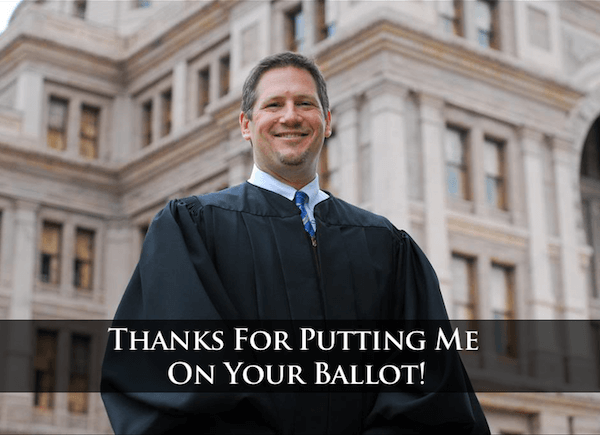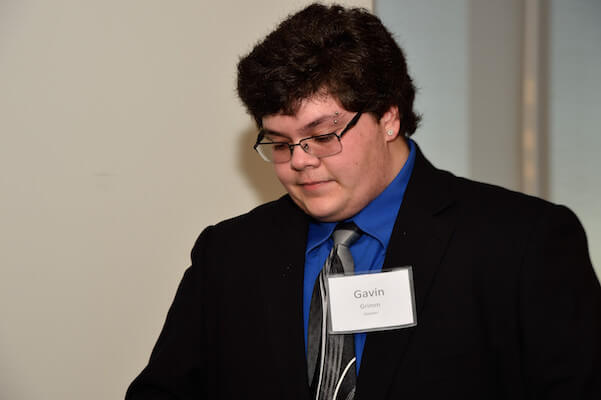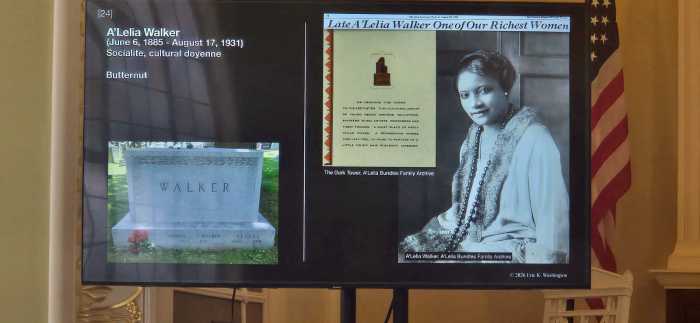A 2014 campaign ad for Texas Supreme Court Justice Jeffrey S. Boyd. | JUSTICEJEFFBOYD.ORG
In a clear misreading of the US Supreme Court’s marriage equality ruling in Obergefell v. Hodges from 2015 — especially as elucidated just days ago by the high court in its Arkansas birth certificate ruling in Pavan v. Smith — the Texas Supreme Court, on June 30, unanimously refused to dismiss a lawsuit by two disgruntled taxpayers who argue that the city of Houston should not provide employee benefits for the same-sex spouses of its employees.
Instead, even while affirming the Texas Court of Appeals’ ruling that reversed a 2014 trial court preliminary injunction against paying those benefits, the Texas high court sent the case back to the trial court to consider whether Obergefell obligates Houston to provide equal benefits to it employees’ same-sex spouses.
The trial court was also directed to consider the taxpayers’ argument that the city should be required to “claw back” the value of benefits paid prior to the Obergefell decision, on the theory that Texas’ refusal to recognize same-sex marriages contracted out of state was valid until the marriage equality ruling was handed down.
Refusing to dismiss challenge to equal spousal benefits for public employees, unanimous bench stirs pot
In the Pavan v. Smith case, the Arkansas Supreme Court had ruled that the Obergefell decision did not require the state to treat same-sex spouses the same as different-sex spouses in listing a birth mother’s spouse as a parent on their child’s birth certificate. Reversing that ruling on the last day of its session, the US Supreme Court, in an unsigned “Per Curiam” opinion, said, “As we explained [in Obergefell], a State may not ‘exclude same-sex couples from civil marriage on the same terms and conditions as opposite-sex couples.’ Indeed, in listing those terms and conditions — the ‘rights, benefits, and responsibilities’ to which same-sex couples, no less than opposite-sex couples, must have access — we expressly identified ‘birth and death certificates.’ That was no accident…”
The Supreme Court, in that way, made clear that same-sex couples, under Obergefell, are entitled to the same rights and benefits of marriage as different-sex couples.
In listing some of the rights and benefits of marriage that same-sex couples had wrongly been denied, the Obergefell court also specifically mentioned health insurance, the employee benefit at issue in the Texas case. So, it is completely disingenuous for the Texas court to claim that Obergefell fails to deal with that question explicitly.
Yet, in Pidgeon v. Turner, Justice Jeffrey S. Boyd wrote for the Texas Supreme Court, “The Supreme Court held in Obergefell that the Constitution requires states to license and recognize same-sex marriages to the same extent that they license and recognize opposite-sex marriages, but it did not hold that states must provide the same publicly funded benefits to all married persons, and — unlike the Fifth Circuit in DeLeon — it did not hold that the Texas DOMAs are unconstitutional.”
DeLeon refers to the Texas marriage equality decision that was issued by the US Fifth Circuit Court of Appeals a few days after the Obergefell decision, holding that the Texas ban on same-sex marriage was unconstitutional in light of the Supreme Court’s action.
Instead of cutting through procedural complications to save everybody involved lots of wasted time and money through prolonged litigation, the Texas court has now repeated the Arkansas Supreme Court’s error by insisting that the Obergefell ruling does not clearly require “the same” rights, benefits, and responsibilities. Incredibly, in support of this point, the Texas court cited the Supreme Court’s decision on June 26 to grant review of a Colorado Court of Appeals ruling, Masterpiece Cakeshop v. Colorado Human Rights Commission, which concerns a totally different question: whether a baker has a First Amendment right to discriminate against a same-sex couple by refusing an order for a wedding cake in violation of that state’s anti-discrimination law.
In its June 2015 Obergefell ruling, the Supreme Court did not address the question of potential clashes between anti-discrimination laws and the free speech and free exercise of religion rights enjoyed by private individuals and organizations.
But the high court most emphatically did address the issue that governmental actors, like the city of Houston, bound by the 14th Amendment, must accord the same rights to all married couples, whether same-sex or different-sex. The court reiterated that point this past week in its Pavan birth certificate ruling.
The Texas case dates back to 2013, when Houston Mayor Annise Parker, an out lesbian, reacted to the Supreme Court’s Windsor decision striking down the federal Defense of Marriage Act by extending benefits to the same-sex spouses of Houston city employees who had gone out of state to get married.
At that time, Texas had both a state Defense of Marriage Act and a similar constitutional amendment, and Houston had a charter provision limiting municipal employee benefits to legal spouses and children of employees. Parker relied on an advisory opinion from Houston’s city attorney in concluding that after Windsor it was unconstitutional to refuse to recognize those out-of-state marriages.
Jack Pidgeon and Larry Hicks, Houston taxpayers who identified themselves as devout Christians who did not want their tax money going to subsidize same-sex marriages, filed a lawsuit challenging Parker’s benefits extension in December 2013. They claimed, based on state and city law, that the benefits extension was “expending significant public funds on an illegal activity,” and persuaded a local trial judge to issue a preliminary injunction against continued payment of the benefits while the case was pending.
The city appealed.
The Texas Court of Appeals sat on the appeal while marriage equality litigation proceeded in federal courts in Texas and elsewhere. Shortly after the Supreme Court ruled in Obergefell on June 26, 2015, the Fifth Circuit, affirming a federal district court ruling, held in DeLeon that the Texas laws banning same-sex marriage were unconstitutional.
At that point, the Texas Court of Appeals reversed the trial court’s preliminary injunction in the Pidgeon case and sent the case back to the trial court with instructions to decide the case “consistent with DeLeon.”
When Pidgeon and Hicks sought to appeal this ruling to the Texas Supreme Court, they were initially turned down. Then the state’s top Republican elected officials — Governor Greg Abbott, Lieutenant Governor Dan Patrick, and Attorney General Ken Paxton — joined by other non-parties, filed papers with the Supreme Court urging it to change its mind. The court, whose members face the voters of Texas every six years, eventually agreed to do so.
In its June 30 ruling, the court buried itself in procedural complications. Based on its incorrect conclusion that Obergefell, as amplified by this week’s Pavan ruling, does not decide the case’s merits — and giving credence to the plaintiffs’ argument that Obergefell cannot be construed to have any retroactive effect because “the Supreme Court acknowledged that it was attributing a new meaning to the Fourteenth Amendment based on ‘new insights and societal understandings’” — the court opined that Pidgeon and Hicks should have an opportunity to “develop” their argument before the trial court.
This contention about retroactivity is not shared by other courts that have ruled on the question, including some that have retroactively applied Obergefell to find that cohabiting same-sex couples in states with common law marriage can be held to have been legally married prior to June 2015.
Indeed, the federal government even gave Windsor retroactive application, allowing same-sex couples to file for tax refunds for earlier years on the basis that the Internal Revenue Service’s refusal to recognize their state-law marriages under DOMA had been unconstitutional.
The Texas Supreme Court agreed with Pidgeon that the Texas Court of Appeals should not have directed the trial court to rule “consistent with DeLeon” because, technically, the state trial courts are not bound by constitutional rulings of the federal courts of appeals, only by US Supreme Court rulings on questions of federal law.
DeLeon could be a “persuasive” precedent, but not a “binding” precedent, Texas’ high court said.
Which merits a big “so what?”
After all, the real question in this case is whether Obergefell requires that married same-sex couples are entitled to the “same benefits” as different-sex couples from their municipal employer, and the answer to that could not be more clear, especially after Pavan. (It should be noted that Justice Neil Gorsuch’s dissenting opinion in Pavan repeats the same mistaken assertion — that Obergefell does not clearly require the “same” rights and benefits, which the court’s Per Curiam opinion responds to by quoting from Obergefell to the opposite effect — and is just as disingenuous as Justice Boyd’s decision for the Texas court.)
Now the case goes back to the trial court in Houston, where the outcome should be dictated by Obergefell and Pavan v. Smith and the court should dismiss this case. But, since this is taking place in Texas, where contempt for federal law is openly expressed by public officials, who knows how it will turn out?




































